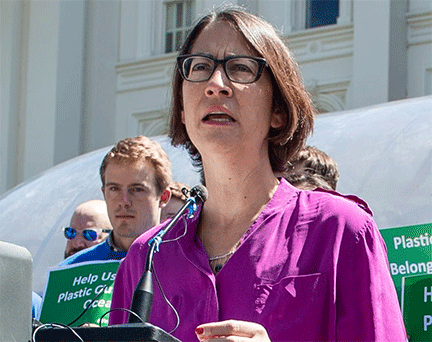On Thursday, Governor Gavin Newsom signed a bill that will abolish parking requirements within one half mile of major transit stops.
The bill, written by Assemblymember Laura Friedman (D-Burbank) aimed to tackle minimum parking requirements. The bill will prohibit minimum parking requirements for new housing, commercial and other developments located near transit to reduce vehicle emissions and promote denser, more affordable housing closer to people’s daily destinations.
According to the AB 2097:
This bill would prohibit a public agency from imposing any minimum automobile parking requirement on any residential, commercial, or other development project, as defined, that is located within 1/2 mile of public transit, as defined. The bill, notwithstanding the above-described prohibition, would authorize a city, county, or city and county to impose or enforce minimum automobile parking requirements on a housing development project if the public agency makes written findings, within 30 days of the receipt of a completed application, that not imposing or enforcing minimum automobile parking requirements on the development would have a substantially negative impact, supported by a preponderance of the evidence in the record, on the public agency’s ability to meet its share of specified housing needs or existing residential or commercial parking within 1/2 mile of the housing development. The bill would create an exception from the above-described provision if the housing development project (1) dedicates a minimum of 20% of the total number of housing units to very low, low-, or moderate-income households, students, the elderly, or persons with disabilities, (2) contains fewer than 20 housing units, or (3) is subject to parking reductions based on any other applicable law. The bill would prohibit these provisions from reducing, eliminating, or precluding the enforcement of any requirement imposed on a housing development project that is located within 1/2 mile of public transit to provide electric vehicle supply equipment installed parking spaces or parking spaces that are accessible to persons with disabilities. By changing the duties of local planning officials, this bill would impose a state-mandated local program.
According to Friedman, she said she had been working on the bill for 2-years and that the average cost for a garage is $24-$34,000 to build and an underground parking space costs $50-$65,000 to build which costs are then passed onto individuals and families, even if they do not drive.
This measure signed by the Governor Gavin Newsom where he issued the following signing statement:
To the Members of the California State Assembly:
I am signing Assembly Bill 2097 which prohibits local agencies from imposing or enforcing parking minimums on residential and commercial developments within one-half mile of a major transit stop unless certain conditions are met.
While this bill will undoubtedly have a positive impact in reaching our state’s climate and housing goals, we must be vigilant in guarding against earnestly unintended consequences. In the absence of this important state policy change, many local governments have rightly taken it upon themselves to craft transit-oriented housing incentive programs. It is not our intent in creating this new law to undermine the efficacy of these local initiatives.
Therefore, I am directing the Department of Housing and Community Development to closely monitor implementation of this bill and identify any unintended outcomes, including impacts to affordable housing development in downtown-oriented development areas.
Should any issues be identified in the implementation of this bill, future legislation may be necessary to address those concerns to ensure both policy objectives can be achieved in a balanced and equitable way.
Gavin Newsom
The bill was introduced by Friedman in February of 2022. It passed the assembly floor on May 26 in a 47-20 vote. It passed the senate on August 29 in a 26-9 vote. Finally, it again passed the assembly in a 52-17 vote on August 30 which sent it to the Governor for signature.
AB 2097 will go into effect on January 1, 2023.

